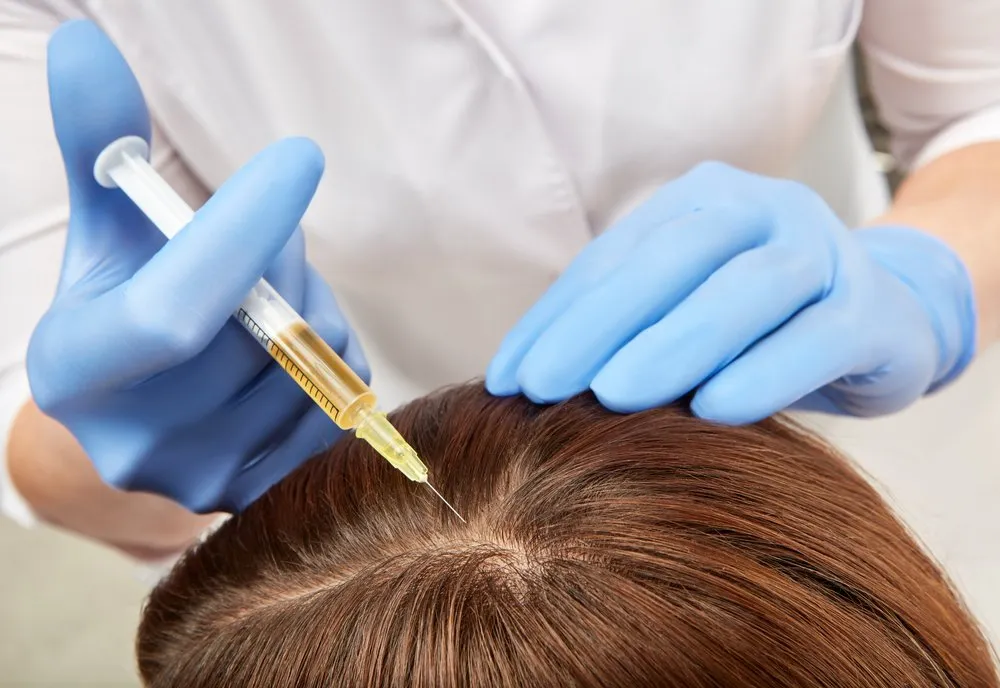If you’ve started hormone replacement therapy (HRT) and noticed more hair in your brush, you’re not alone. But does hormone replacement cause hair loss, or is it just your body adjusting?
In this guide, we’ll explore how HRT affects hair health, which types of hormones may trigger shedding, and—most importantly—what you can do to minimize or prevent hair loss. With expert insights and patient-friendly tips, you’ll feel more informed and confident navigating this journey.
Understanding Hormone Replacement Therapy (HRT)

What is HRT and Why is it Used?
Hormone Replacement Therapy (HRT) involves supplementing the body with hormones like estrogen, progesterone, or testosterone. It’s commonly prescribed to:
- Manage menopausal symptoms (hot flashes, mood swings, vaginal dryness)
- Treat hormonal imbalances (e.g., in PCOS or hypothyroidism)
- Support gender-affirming care for transgender individuals
- Improve bone health and reduce osteoporosis risk in aging adults
Common Types of Hormone Replacement
HRT comes in various forms and hormone combinations:
- Estrogen-only therapy (often used for women post-hysterectomy)
- Estrogen + progesterone (for women with intact uterus)
- Testosterone replacement (for low-T in men and gender-affirming care)
- Bioidentical hormones (plant-derived hormones tailored to individual needs)
Can Hormone Replacement Cause Hair Loss?
How Hormones Affect the Hair Growth Cycle
Hormones play a central role in the hair growth cycle. Estrogen tends to support hair retention by prolonging the anagen (growth) phase, while androgens like testosterone and its derivative DHT (dihydrotestosterone) can shrink hair follicles, leading to thinning and eventual hair loss.
Why Hair Loss May Occur with HRT
Yes, hormone replacement can cause hair loss, especially during the adjustment phase or if hormone levels become imbalanced. Here’s why:
- Fluctuations in estrogen or testosterone can trigger telogen effluvium, a temporary shedding condition.
- Testosterone replacement may increase DHT levels, a common cause of androgenic alopecia (pattern hair loss).
- In transgender women, improper estrogen dosing or lack of DHT blockers can also result in thinning hair.
Types of Hair Loss Linked to HRT
- Telogen Effluvium – Sudden shedding caused by hormonal shifts
- Androgenic Alopecia – Gradual thinning due to increased DHT sensitivity
- Diffuse Thinning – Often seen in postmenopausal women or after therapy begins
Risk Factors That Make Hair Loss More Likely
Genetic Predisposition
If you have a family history of pattern baldness, HRT may accelerate an already existing condition, particularly when testosterone levels are increased or not balanced with anti-androgens.
Dosage and Type of Hormone Used
- High-dose testosterone increases DHT conversion, especially in women
- Inadequate estrogen can cause thinning in menopausal women
- Poorly regulated compounded HRT (bioidentical) may lack consistency
Underlying Conditions
- Polycystic Ovary Syndrome (PCOS) – Can lead to higher androgen levels
- Thyroid disorders – Both hypothyroidism and hyperthyroidism impact hair growth
- Menopause – Naturally lowers estrogen, contributing to hair loss
How to Prevent or Minimize Hair Loss During HRT
Adjusting Dosage with a Specialist
Always work with an endocrinologist or HRT-specialized physician who can:
- Fine-tune hormone levels
- Monitor your response regularly with blood tests
- Adjust therapy to avoid spikes in DHT or sudden drops in estrogen
Supporting Hair Health with Nutrition and Supplements
- Iron, zinc, and biotin are essential for healthy hair
- Omega-3 fatty acids support scalp health
- Consider supplements like saw palmetto (a natural DHT blocker)
Use of DHT Blockers or Anti-Androgens
These are especially helpful in:
- Transgender women on testosterone-lowering HRT
- Cisgender women with androgenic alopecia or PCOS
Common options include:
- Spironolactone
- Finasteride (oral or topical) – [Link to: Topical Finasteride Guide]
- Dutasteride (used off-label)
Regular Monitoring & Lab Tests
Frequent hormone level checks ensure balance and help detect patterns contributing to hair thinning before they progress.
When to See a Specialist
Signs Your Hair Loss May Be Hormone-Related
- Sudden hair shedding a few weeks/months after starting HRT
- Thinning around temples or the crown
- Worsening of the existing pattern of hair loss
What a Dermatologist or Endocrinologist Can Do
- Perform scalp exams and blood tests
- Assess hormonal imbalances (e.g., estrogen/testosterone ratios)
- Prescribe targeted treatments based on the cause
Expert Opinions on HRT and Hair Loss
Insights from Trichologists and Hair Restoration Experts
- Recommend combining HRT with scalp care treatments
- Often suggest PRP therapy or low-level laser therapy (LLLT) to stimulate growth
- Emphasize early intervention to preserve follicle health

FAQs About HRT and Hair Loss
Does estrogen replacement cause hair thinning?
It can in some women, especially if the dose is too low or fluctuating. Estrogen generally supports hair growth, but a sudden drop or imbalance may trigger shedding.
Can testosterone HRT lead to baldness in women?
Yes, especially if it increases DHT levels. Female hair follicles are sensitive to androgens, and without DHT blockers, thinning may occur.
Is hair loss from hormone therapy reversible?
Often yes, especially if caught early and addressed with dosage changes, supplements, or treatments like PRP.
What kind of doctor should I see for HRT-related hair loss?
An endocrinologist for hormone balance and a dermatologist or hair restoration expert for hair health guidance.
Final Thoughts
So, does hormone replacement cause hair loss? It can—but it doesn’t have to. With the right medical support, hormone adjustments, and proactive scalp care, most people can manage or even reverse this side effect. Whether you’re starting HRT for menopause, low testosterone, or gender affirmation, your hair health doesn’t need to be compromised.
Worried about hair loss during hormone therapy? Book a consultation with Dr. Rana Irfan in Islamabad today to receive expert, customized guidance for your hair and hormonal health. Your journey to balanced hormones and healthy hair starts here.
